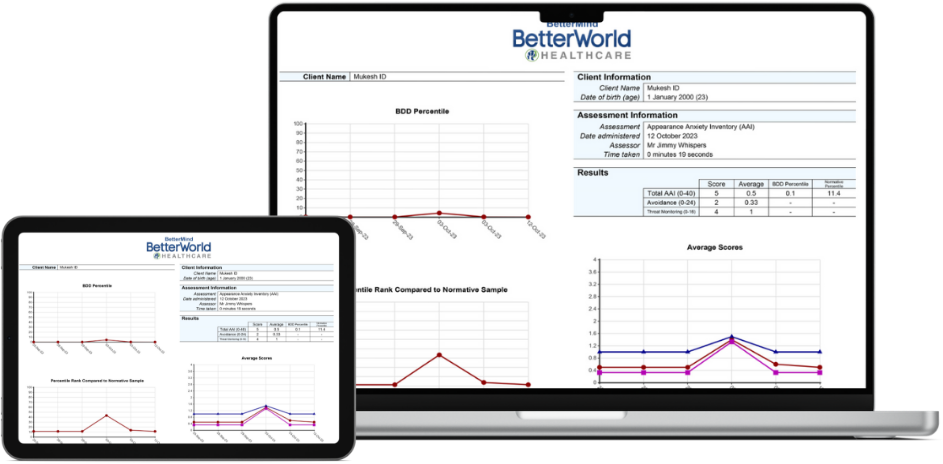Difficulties in Emotion Regulation Scale (DERS)
Assessments
Description
The Difficulties in Emotion Regulation Scale (DERS) is a instrument measuring emotion regulation problems. The 36 items ask the respondent to rate themselves on how they relate to their emotions. This tool can be especially useful in helping patients identify areas for growth in how they respond to their emotions, especially those with Borderline Personality Disorder, Generalised Anxiety Disorder or Substance Use Disorder.
This scale measures an integrative conceptualization of emotion regulation as involving not just the modulation of emotional arousal, but also the awareness, understanding, and acceptance of emotions, and the ability to act in desired ways regardless of emotional state.
Given that successful emotion regulation is a key aspect of personal well being, difficulties in emotion regulation are theorised to be a transdiagnostic risk for the onset and maintenance of psychopathological disorders.
The scale has the following subscales:
1. Nonacceptance of emotional responses
2. Difficulty engaging in Goal-directed behaviour
3. Impulse control difficulties
4. Lack of emotional awareness
5. Limited access to emotion regulation strategies
6. Lack of emotional clarity
Validity
In a sample of undergraduate students (Gratz & Roemer, 2003) found that the DERS had high internal consistency, good test–retest reliability, and adequate construct and predictive validity.
Based on a sample of 427 adults presenting at an outpatient clinic diagnosed with one or more DSM-5 disorder, Hallion et al. (2018) found that the DERS has good internal consistency, particularly when the Awareness subscale is excluded, indicating that Awareness may be a seperate construct. The means and standard deviations for the same sample are presented below.
– Total M = 89.33, SD = 22.64
– Non-acceptance M = 14.67, SD = 5.92
– Goals M = 15.42, SD = 4.215
– Impulse M = 12.58, SD = 4.97
– Awareness M = 15.55, SD = 4.92
– Strategies M = 19.67, SD = 7.31
– Clarity M = 12.01, SD = 4.04
Interpretation
Higher scores suggest greater problems with emotion regulation. Scores are presented as a total score as well as a score for each of the 6 subscales. Scores are also presented as a percentile rank, which compares the scores against adults seeking outpatient psychological therapy (Hallion et al., 2018). A percentile of 50 indicates typical scores in comparison to others presenting for treatment, with high (more severe) scores being predictive of bigger treatment gains from CBT.
1. Nonacceptance of emotional responses: 11, 12, 21, 23, 25, 29
2. Difficulty engaging in goal-directed behaviour: 13, 18, 20R, 26, 33
3. Impulse control difficulties: 3, 14, 19, 24R, 27, 32
4. Lack of emotional awareness: 2R, 6R, 8R, 10R, 17R, 34R
5. Limited access to emotion regulation strategies: 15, 16, 22R, 28, 30, 31, 35, 36
6. Lack of emotional clarity: 1R, 4, 5, 7R, 9
Developer
Gratz, K. L., & Roemer, L. (2004). Multidimensional assessment of emotion regulation and dysregulation: Development, factor structure, and initial validation of the difficulties in emotion regulation scale. Journal of psychopathology and behavioral assessment, 26(1), 41-54.
Try it and see how BetterMind can enhance your practice

Support
Frequently Asked Questions
You’ve got questions, we’ve got answers. Below you can find answers to some of the most frequently asked questions. If you can’t find the answer you’re looking for, please feel free to reach out to us at info@betterworldhealthcare.com.
I can’t open test results within the Web Browser
Assessment result PDFs are opened in a new tab within the web browser. If you click the results but they do not open, your browser will be blocking the popup. To resolve this, after you have pressed the test result, look out for an alert at the top of your browser notifying you that a pop-up has been blocked, then click "Allow".
I have forgotten my password. How can I reset it?
If you have forgotten your password please press “forgot password” within the app, or on the Web Browser App login page (https://app.bettermind-app.com/login). You will receive a new temporary password via email.
Can a Practitioner access BetterMind from their Smartphone?
No, A Client /Patient can answer assessment questions on a smartphone but the Practitioners/ Users can't administer BetterMind using a Smartphone. A computer, laptop or tablet will have to be used.


